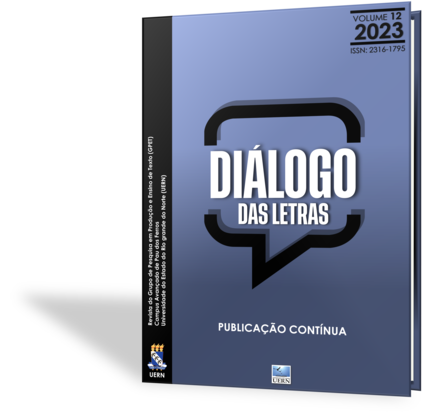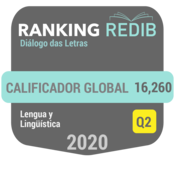Sistema lógico-semântico de expansão na reescrita de textos acadêmicos: escolhas linguísticas de uma estudante versus as escolhas do ChatGPT
DOI :
https://doi.org/10.22297/2316-17952023v12e02307Mots-clés :
Linguística Sistêmico-Funcional, Reescrita, ChatGPT, Inteligência ArtificialRésumé
O estudo aborda as escolhas linguísticas presentes na reescrita de textos produzidos por aprendizes novatos em contexto acadêmico e pela ferramenta ChatGPT. Tem-se por objetivo analisar essas escolhas linguísticas a partir do sistema lógico-semântico de expansão (HALLIDAY; MATTHIESSEN, 2004; 2014) presentes em versões reescritas de um mesmo texto. De natureza qualitativa e interpretativa, o corpus é constituído pela escrita e a reescrita de uma estudante de primeiro semestre de graduação e três versões produzidas pelo ChatGPT, visando à comparação dessas ocorrências. A análise enfoca a natureza das mudanças nos complexos oracionais de todas as versões reescritas, buscando compreender quais mudanças no sistema lógico-semântico são recorrentes. Os resultados mostram que a expansão por intensificação é priorizada pelo ChatGPT através do acréscimo de modificadores, o que difere das escolhas da estudante. O ChatGPT segue um padrão, iniciando com orações paratáticas estendidas (1^+2) e dá continuidade com complexos oracionais elaborados hipotaticamente (α^ =β). O ChatGPT oferece respostas diferentes de acordo com o comando dado, numa tentativa de se assemelhar à reescrita, mas mostra dificuldade em produzir seguindo instruções extensas e reconhecer variáveis contidas no feedback. A contribuição diz respeito a entender como o ChatGPT lê as orientações disponibilizadas para reescrever um texto.
Téléchargements
Références
ANDERSON, N.; BELAVY, D. L.; PERLE, S.M. et al. AI did not write this manuscript, or did it? Can we trick the AI text detector into generated texts? The potential future of ChatGPT and AI in Sports & Exercise Medicine manuscript generation. BMJ Open Sport & Exercise Medicine. v.9, e001568. 2023.
DÖRNYEI, Z. Research methods in Applied Linguistics. New York: Oxford University Press, 2007.
FRÖHLING, L.; ZUBIAGA, A. Feature-based detection of automated language models: Tackling GPT-2, GPT-3 and Grover. PeerJ Computer Science, v.7, n.e443, 2021.
GEHRMANN, S., STROBELT, H., & RUSH, A. M. GLTR: Statistical Detection and Visualization of Generated Text. arXiv:1906.04043). arXiv. 2019.
HALLIDAY, M. A. K. An introduction to functional grammar. London: Edward Arnold, 1985 [3. ed. Rev. by C. M. I. M. Matthiessen, 2004; 4. ed. Rev. by C. M. I. M. Matthiessen, 2014].
HALLIDAY, M. A. K. Language as a social semiotic: the social interpretation of language and meaning. London: Edward Arnold, 1978.
KASNECI, E., et al. “ChatGPT for Good? on Opportunities and Challenges of Large Language Models for Education.” EdArXiv, 30 Jan. 2023. Disponível em: https://edarxiv.org/5er8f/. Acesso em 20 de março de 2023.
KING, Michael R. Editorial. A Conversation on Artificial Intelligence, Chatbots, and Plagiarism in Higher Education. Cellular and Molecular Bioengineering, vol. 16, n. 1, p. 1–2, 2023.
KUMAR, A. HS. Analysis of ChatGPT Tool to Assess the Potential of its Utility for Academic Writing in Biomedical Domain. BEMS Reports, v.9, n. 1, p. 24-30, 2023.
MITROVIC, S. et al. ChatGPT or Human? Detect and Explain. Explaining Decisions of Machine Learning Model for Detecting Short ChatGPT-generated Text, arXiv:2301.13852v1 [cs.CL] 30 jan 2023.
PERKINS, M. Academic Integrity considerations of AI Large Language Models in the post-pandemic era: ChatGPT and beyond. Journal of University Teaching & Learning Practice, v. 20, no. 2, 2023.
ROSPIGLIOSI, P. ‘asher’. Artificial intelligence in teaching and learning: what questions should we ask of ChatGPT? Interactive Learning Environments, v.31, n. 1, p. 1-3, 2023.
THOMPSON, G. Introducing Functional Grammar. 3a. ed. Routledge/Taylor & Francis Group. London, 2014.
Téléchargements
Publiée
Comment citer
Numéro
Rubrique
Licence
© Diálogo das Letras 2023

Ce travail est disponible sous la licence Creative Commons Attribution 4.0 International .
A Diálogo das Letras não se responsabiliza por conceitos e opiniões emitidos pelos autores, tampouco manifesta, necessariamente, concordância com posições assumidas nos textos publicados. Além disso, os dados e a exatidão das referências citadas no trabalho são de inteira responsabilidade do(s) autor(es). Ao submeterem seus trabalhos, os autores concordam que os direitos autorais referentes a cada texto estão sendo cedidos para a revista Diálogo das Letras; ainda concordam que assumem as responsabilidades legais relativas às informações emitidas.
























